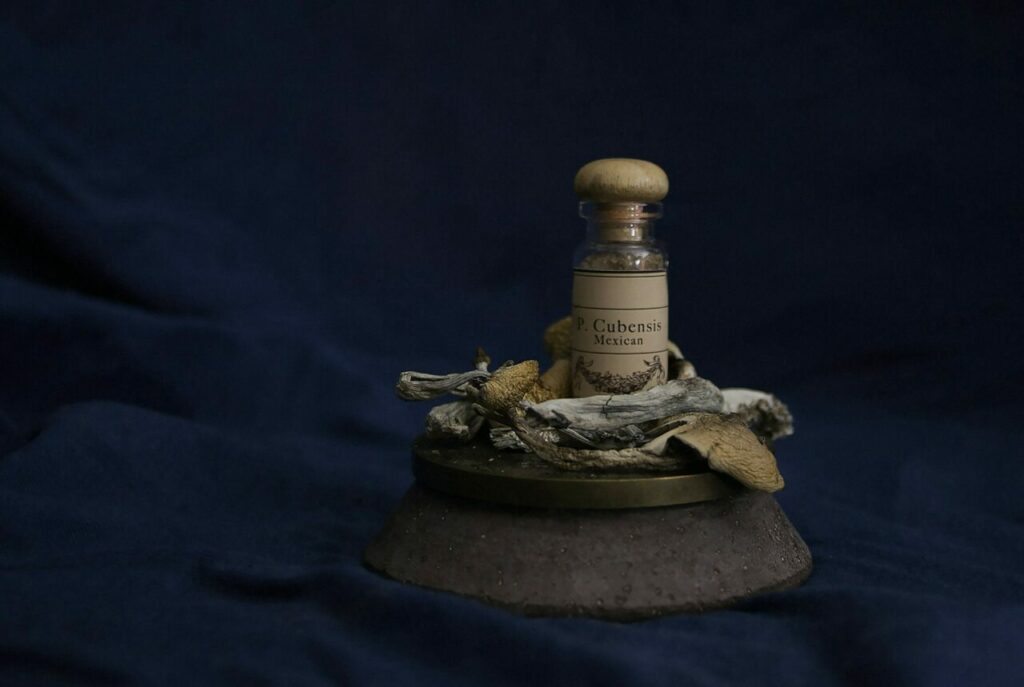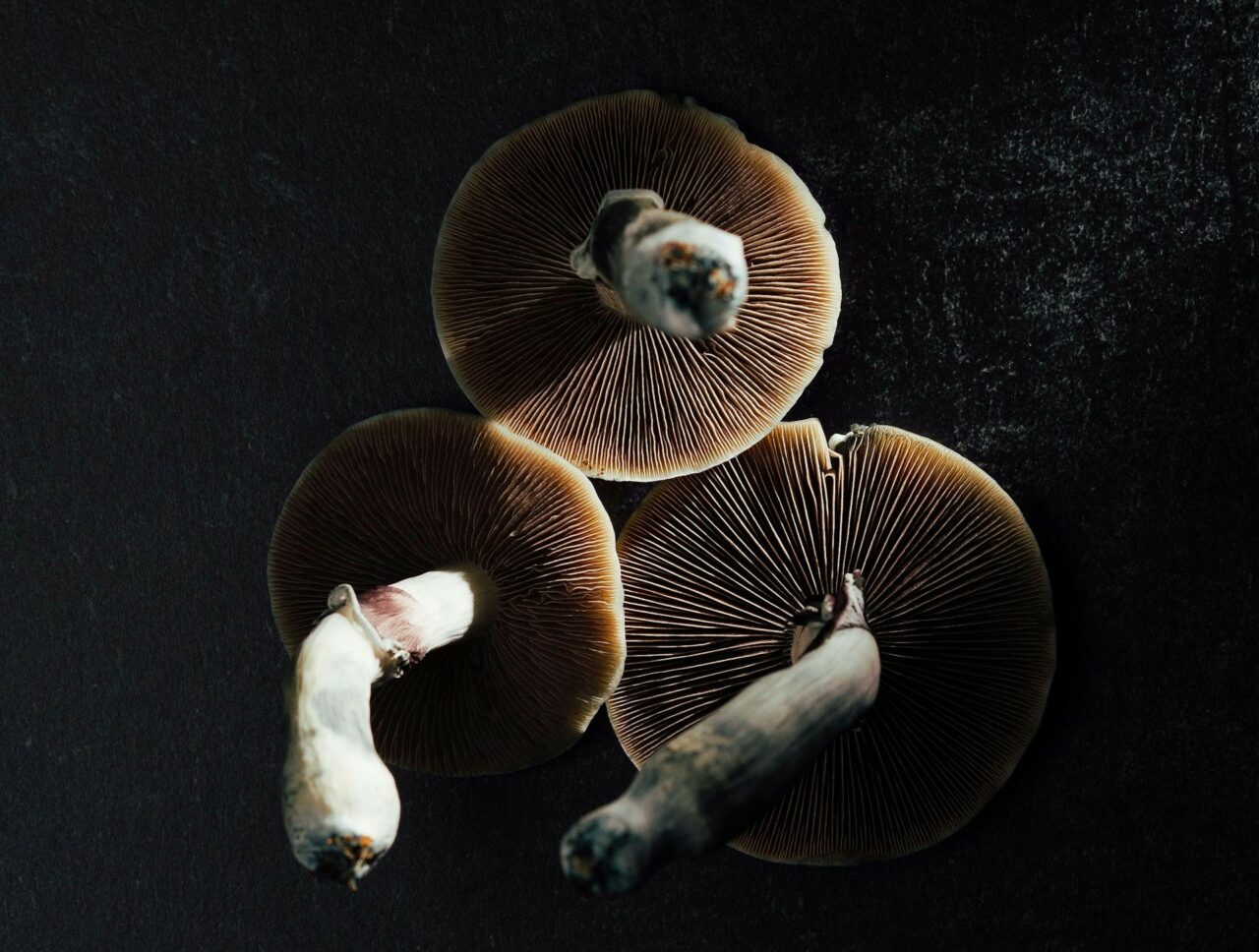The increasing interest in natural magic mushrooms in Canada accompanies a simultaneous rise in the popularity of lab-created psilocybin products. Researchers are often drawn to these products due to their controlled dosage. However, they might not realize that natural mushrooms can potentially be more potent than their lab-made counterparts. Experts have underscored important variations between the two, including differences in potency.

Key Takeaways:
- More than 180 species of natural mushrooms provide varying degrees of potency. The impacts are influenced by the species, consumption method, cultivation, and individual tolerance.
- Synthetic psilocybin, a lab-produced version of the natural compound, is created in controlled environments. This ensures consistency and purity for clinical research, especially for mental health treatments.
- The combined effects of several compounds in psychedelic mushrooms, like psilocin and baeocystin, can lead to a more profound and intense experience than a single compound alone.
Emerging Market: Psychedelics in Diverse Forms
Psilocybin mushrooms are gaining popularity in Canada, particularly as treatment for specific mental health disorders like OCD, depression, PTSD, and anxiety. In light of this growing interest, local governments are starting to contemplate decriminalizing recreational use.
In 2020, Canada approved limited medical use of these mushrooms under certain conditions. Just the previous year, the federal government granted permission for specific terminally ill patients to use these substances to alleviate their symptoms.
Such progressive steps have led to the advent of synthetic psychedelics.
The Ongoing Discourse
The continuous discussion on natural versus lab-made psychedelics focuses on matters of safety, affordability, and accessibility.
Many believe that natural psychedelics provide a more comprehensive and traditional experience. However, advocates of lab-made versions emphasize their easy standardization for medical use, along with guaranteed dosage control and quality assurance.
While lab-made psychoactive substances may increase accessibility, concerns remain about possible drug monopolization. Critics argue this could result in less accessibility and increased costs for users.
/wp:paragraph –>A Comprehensive Guide to Understanding Psilocybin
Psilocybe cubensis, a type of magic mushroom, is among the plethora of naturally occurring psychedelic substances available currently. Magic mushrooms, renowned for their mind-altering effects, encompass a variety of strains including Golden Teachers, Amazonian Cubensis, Blue Meanies, among others, with Psilocybe cubensis standing as the most notable species.
Deciphering the Psychedelic Process
Psilocin, a product of this mushroom, converts into a distinct chemical once metabolized by the liver. This transformed substance interfaces with the brain’s serotonin receptors, primarily the 5-HT2A receptor.
This receptor is integral to mood regulation, cognitive processes, and perception. Its interaction with the transformed compound alters the standard functioning of serotonin pathways, inducing changes in visual and auditory perception, thought processes, and emotional states. This results in an elevated mood, enhanced creativity, introspection, and the unique “psychedelic” experiences.
Two Predominant Categories
| Natural | Found in over 180 species of fungi, the strength varies depending on the mushroom species. Psilocybe cubensis is a widespread variety. The effects can vary based on consumption techniques, cultivation practices, and individual resistance. |
| Synthetic | Manufactured in labs and chemically identical to natural compounds. They are developed in regulated environments to maintain consistency and purity. These are progressively being researched for clinical uses, particularly in the realm of mental health treatments. |
The Fundamental Differences between Nature’s Gift and Science’s Creation
Natural versions of these psychoactive substances are embedded in certain species of magic mushrooms. Indigenous communities in North and South America have incorporated these mushrooms in their rituals and ceremonies, venerating them as sacred or divine.
- Derived from plants and mushrooms
- Incorporated in ancient rituals and healing customs
- The unique genetic composition of each strain influences its potency
On the other hand, the
A synthetically produced drug is This substance closely mirrors the natural chemical makeup of a particular compound. Expertly crafted by professionals in controlled settings, these medicines are designed for precision. While they function similarly to their natural counterparts, they can alter the entire psychedelic experience.
- Developed by experienced pharmaceutical experts
- New advancements intended for medicinal uses
- Consistent potency as a result of regulated manufacturing
Organic substances provide more advantages due to their bioactive compounds. Various types of mushrooms contain different quantities of psilocybin and other compounds, resulting in a range of effects.
Researcher Insights
A study carried out at Hebrew University showed that psychedelic mushrooms have a more potent and longer-lasting impact on synaptic plasticity than their synthetic counterparts. The research team examined the effects of the drug on mouse brain activity by observing behavioural and chemical changes.
The study discovered that the extract reduced head twitching and promoted the formation of new brain connections. This suggests that mushroom extract might offer more advantages than a single compound.
The research team also introduced the “entourage effect” concept, which refers to the enhanced effect resulting from the combined influence of multiple compounds in psychedelic mushrooms, compared to the effects of individual compounds. In the context of mushrooms, compounds like psilocin, baeocystin, and other tryptamines could work together to create a profound experience.
These additional chemicals are not found in lab-produced substances, potentially leading to minor differences in effects, even if the psychedelic content is the same.
Expert Opinions on Nature’s Superiority
Research consistently shows that psilocybin, in any form, offers promising results in treating a range of psychiatric disorders. A 2024 study examined the effects of controlled substances on patients with treatment-resistant depression and found reduced symptoms following the administration of magic mushrooms.
When used alongside other treatments, organic psychedelics may promote more profound emotional processing and insights during therapy sessions, thereby enhancing long-term results.
Researchers from the same university have found that hallucinogenic mushrooms boost synaptic plasticity. They possess a unique metabolic profile that influences oxidative stress and energy production pathways, unlike lab-made psychedelics.
Potential Market Impact
The growing volume of research on this subject might sway Canadians’ perceptions and buying behaviours regarding psychedelics. Initial efforts by Health Canada, such as the Special Access Program, are demonstrating early indications of facilitating legalization and revolutionizing therapeutic approaches. Psilocybin-assisted therapy could soon become a prevalent treatment method.
Emphasis on organic options is predicted to rise significantly in clinical trials and therapeutic settings. As the country advances towards fully harnessing the benefits of organic psychedelics, substantial progress in mental health treatments is likely on the horizon.
Advice for Safely Procuring Shrooms in Canada
- Section 56 Exemption: Health Canada recognizes that individuals with severe health conditions may use psilocybin as an alternative treatment. This exemption is included under the Controlled Drugs and Substances Act.
- Clinical Trials: Initial clinical trials are being approved to investigate the drug’s potential for treating mental health disorders. Participants must meet specific requirements and pass a medical screening.
- Online Market: Psilocybin capsules or edibles can be purchased from online sellers in Canada, but it’s crucial to buy from reputable sources.
Explore the Strength of Natural Substances
Nature is full of marvels, including shrooms. Rather than turning to synthetic psychedelics, consider the naturally potent magic mushrooms from Canada. They are powerful and therapeutic. Discover the best, naturally sourced shroom strains at Magic Mushrooms Quebec Canada.
The shrooms we provide exceed standards by maintaining their purest and most genuine composition in dried form. Order now and have your chosen products discreetly and conveniently delivered to your home.
Frequently Asked Questions
What are baeocystin and norbaeocystin?
These two substances are types of tryptamine or indole alkaloids. They are chemically akin to psilocybin. These tryptamine derivatives act as secondary alkaloids in shrooms, contributing to the overall psychedelic experience, although to a lesser extent. Baeocystin and Norbaeocystin have a similar chemical structure, but different in their mind-altering effects.
Are organic dried mushrooms included in capsules and edibles?
Experiences may vary depending on the source of the product. Online Dispensaries offer products that are rich in organic compounds, facilitating a comprehensive entourage effect. It is common for synthetic compounds in the form of capsules to be used in clinical trials and clinics.
Can natural psychedelics lead to deeper experiences?
It’s crucial to understand that expecting a profound experience from a natural psychedelic might actually bring about that exact result. Our expectations, a component of the ‘set’, can guide the journey. Natural psychedelics, frequently linked with ceremonial traditions, can lead to uniquely fulfilling experiences within this ritualistic context. These experiences differ significantly from those in clinic sessions involving synthetic compounds.





